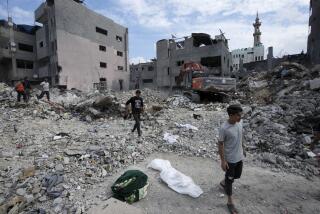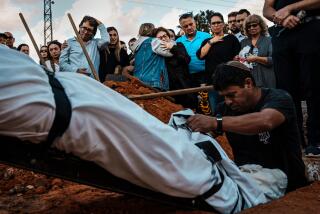In Syria, reported killings in Homs spread fear of sectarian war
Reporting from Beirut —
A rash of reported kidnappings and killings is spreading fear in the restive Syrian city of Homs, where activists and residents said Tuesday that dozens of bloodied bodies, some of them mutilated and bearing signs of torture, were found in the streets over a 24-hour period.
Motivation for the reported killings was far from clear Tuesday, but they were portrayed by the opposition as a brutal attempt to ignite sectarian war in a city that has been the epicenter of a nearly 9-month-old uprising against President Bashar Assad. The government typically lays blame for such attacks on what it describes as armed “terrorists” receiving support from abroad.
As rumors swirled about who was responsible, fear of a sectarian backlash grew in the city, which has already seen a number of unexplained abductions and tit-for-tat killings.
Violence has been escalating in Homs as government tanks and troops press an assault against neighborhoods said to be harboring military defectors and others who have taken up arms against Assad’s regime.
In the worst single incident this week in Homs, the British-based Syrian Observatory for Human Rights and several activists said 34 bodies were found Monday in Zahra, an impoverished, religiously mixed neighborhood heavily populated by members of Assad’s minority Alawite sect, a small offshoot of Shiite Islam.
Identifying the victims was proving difficult because of the condition of the bodies, activists said. But most were believed to be members of the city’s Sunni Muslim majority, which has been the driving force behind months of protests against the Alawite-dominated regime. At least three were said to be Christians, according to the Observatory.
“This is mad,” said Mousab Azzawi, a spokesman for the group in London. “They are trying to ignite sectarian hatred.”
Gory video purporting to show some of the victims was posted on YouTube, including two young brothers lying on a mat, their faces bruised, bloody and swollen. The elder of the two appeared to have been shot in the chest.
A resident with a connection to the family said the siblings, 17 and 23, worked at a flour factory and had taken a taxi to Zahra on Monday morning to make a delivery.
“According to the driver, they were kidnapped from the car by shabiha [pro-government militiamen] and killed in Zahra square,” she said, speaking on condition of anonymity for fear of retribution. “Their bodies were later returned to their families.”
Another video was said to show the mangled corpse of a taxi driver seized Monday from the Karm al Zaitoun neighborhood and dumped in Zahra.
Journalists are severely restricted in Syria, so the accounts could not be independently verified.
“Without news agencies, it will take a million investigations for us to begin to understand what has happened here,” said a Homs native living in the Syrian capital, Damascus.
In all, as many as 65 people were said to have been killed across Syria Monday and Tuesday, according to the Local Coordination Committees, a coalition of opposition activists.
The United Nations says more than 4,000 people have been killed since March, when major protests began.
Syrian officials dispute the figure and say more than 1,100 security personnel have been killed.
The United States said Ambassador Robert Ford had returned to Damascus on Tuesday to act as a witness to the violence and to meet with opposition figures, the Associated Press reported. Ford has been an outspoken critic of the crackdown and was recalled in October amid threats to his safety.
In Geneva, U.S. Secretary of State Hillary Rodham Clinton urged opposition members to help set Syria “on the path of the rule of law and protecting the universal rights of all citizens, regardless of sect or ethnicity or gender.”
She spoke after meeting six members of the Syrian National Council, an opposition umbrella group that is trying to establish itself as an alternative to Assad’s government.
Paul is a special correspondent.
More to Read
Sign up for Essential California
The most important California stories and recommendations in your inbox every morning.
You may occasionally receive promotional content from the Los Angeles Times.










